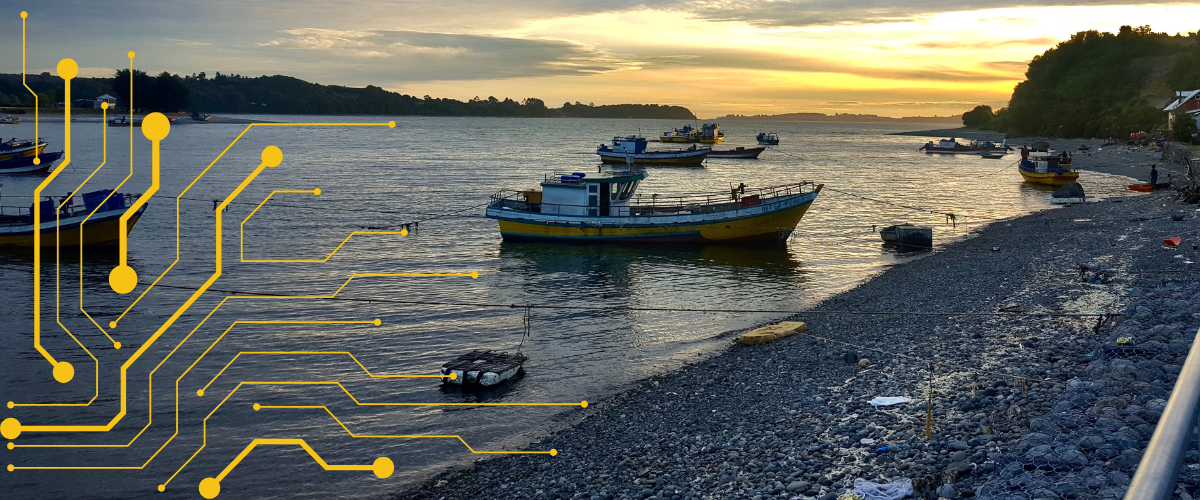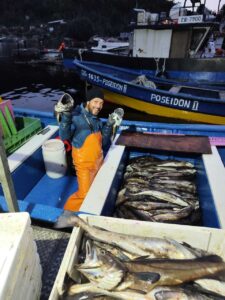
Southern hake, a species deeply rooted in the culture of the seas of southern Chile, is a resource whose commercialization supports numerous coastal communities in the Aysén Region. However, the artisanal fishery of this species faces challenges in its management and administration, in addition to being in an overexploited state for years. Its supply chain often involves multiple intermediaries, making it difficult to trace the origin of the fish, ensure sustainable practices and provide a fair income for local fishers. Aware of this problem, Oceana Chile, in collaboration with the Future of Fish Foundation Chile (FoF Chile), the communities of Puerto Gala and Puerto Gaviota, and the FAO/GEF Marine and Coastal Governance Project, has launched a project that seeks to transform this reality.
The project “Traceability and Value Chains in the Artisanal Hake Fishery, Aysén Region” was created with the objective of improving the management and traceability of this fishery. How? Through the joint work of multiple actors, including local communities, the Municipality of Cisnes, SERNAPESCA, and SUBPESCA. The goal is to deeply understand the value chain of southern hake and generate solutions that optimize its management. The focus is on the transparency of the process, from extraction to commercialization, and on ensuring better income for the communities that depend on this resource.

One of the pillars of this project is the design and implementation of legal and traceable commercialization pilots that allow tracking the origin and journey of the product. This not only implies the creation of the system but also conducting tests to identify and correct possible failures, as well as supporting the government in its implementation in two coves, with the vision of replicating it in others. Additionally, the project seeks to create a “hub” or distribution center for southern hake in the region to promote larger-scale sales to restaurants.
But what are the specific benefits expected from this project? Firstly, it seeks to increase transparency in the southern hake fishery. This means that consumers will be able to know the origin of the fish that reaches their tables, the fishing practices used, and the path the product traveled. Secondly, it seeks to generate better income for the local communities that depend on this fishery by selling it with added value in a self-managed way (with the support of our teams). By improving management and traceability, it is expected that artisanal fishers can access better prices and markets, improving their quality of life.
Thirdly, it seeks to contribute to the sustainability of the southern hake fishery management. Transparency and traceability are key tools to ensure that fishing is carried out responsibly, respecting quotas and avoiding illegal fishing. Finally, this project, with support from our friends at ABALOBI, is expected to contribute to implementing a traceability system that not only benefits consumers and fishers but also strengthens the responsible management of this resource.
This project not only focuses on technology and logistics but also recognizes the importance of human capital. It works in conjunction with fishers, recognizing their knowledge and experience, to co-create solutions that adapt to the local reality. It seeks to empower communities by providing them with tools to autonomously manage the commercialization of southern hake.
In short, the project “Traceability and Value Chains in the Artisanal Hake Fishery, Aysén Region” is a comprehensive initiative that seeks to improve the management of this resource, ensuring its sustainability and benefiting the local communities that depend on it. Transparency, traceability, and collaboration are the pillars of this project, which seeks to ensure a prosperous future for southern hake and those who fish it.
Glossary
Value Chain
A “value chain” in fisheries refers to the complete series of activities, from catching fish to reaching the final consumer, including harvesting, processing, transportation, wholesale, and retail marketing, where value is added to the product at each stage, encompassing all stakeholders involved in bringing fish to market.
Commercialization
Commercialization refers to the process of transforming fish and seafood products from local, artisanal fishing operations into marketable goods. This includes market access, value addition, supply chain integration, sustainability considerations and cultural impact.
Published Dec 17, 2024




